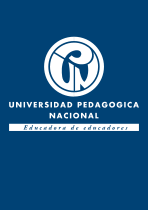Kant y la pedagogía. Fenomenología de la génesis individual y colectiva del imperativo moral.

Citación
Fecha
2003-07-01Autor
Vargas Guillén, Germán
Enlace al recurso
https://revistas.pedagogica.edu.co/index.php/PYS/article/view/6169Metadatos
Mostrar el registro completo del ítemResumen
En contexto de discusión se estudia cómo el Tratado de pedagogía de Kant es una obra del final de la vida del autor y la hipótesis de investigación que guía este estudio; en la sección I. La constitución de la pedagogía como disciplina: se caracteriza, en primer lugar, el tema de la naturaleza humana y necesidad de la pedagogía en la perspectiva kantiana; en segundo lugar, la relación entre naturaleza y fines de la educación; en tercer lugar, la ciencia de la educación o pedagogía; en cuarto lugar, los componentes de la educación; y, en quinto lugar, las modalidades de la educación. En la sección II. La pedagogía: ‘entre’ (o ‘cabe’) filosofía especulativa y filosofía práctica se analiza cómo aquélla –la pedagogía– comparte una y otra dimensiones (especulativa y práctica), pero no puede ser abordada exclusivamente desde ninguna de ellas. En la sección III. Sentimientos morales y “sentido de humanidad universal” se estudia lo que ha dado en llamarse la educabilidad del ser humano, en particular, en lo que ésta significa a la luz de los proyectos de eticidad y moralidad. La sección IV., Coletilla, se ocupa de caracterizar los alcances de la propuesta desarrollada. El Postscriptum: Kant y el presente, desarrollado a instancias de los editores, de manera puntual –y al margen del trabajo exegético previo– se centra en establecer las consecuencias del planteamiento desarrollado específicamente para el campo intelectual de la educación y de la pedagogía.
Abstract
In discussion Context it is studied how the Treaty of pedagogy of Kant is a work of the end of the author’s life and the investigation hypothesis that it guides this study; in the section I., The constitution of the pedagogy like discipline: it is characterized, in the first place, the topic of the human nature and necessity of the pedagogy in the Kantian’s perspective; in second place, the relationship between nature and ends of the education; in third place, the science of the education or pedagogy; in fourth place, the components of the education; and, in fifth place, the modalities of the education. In the section II., The pedagogy: ‘among’ (or ‘cabe’) speculative philosophy and practical philosophy, is analyzed how that –the pedagogy– it shares an and another dimensions (speculative and practice), but it cannot be approached exclusively from none of them. In the section III., Moral feelings and “universal humanity’s sense” that is studied that has given in calling himself the human being’s educability, in particular, in what this means by the light of the ethical projects and morality. The section IV., is in charge of characterizing the reaches of the developed proposal. The Postscriptum: Kant and the present, developed to instances of the editors, in a punctual way –and to the margin of the work previous exegesis– it is centered in establishing the consequences of the position developed specifically for the intellectual field of the education and of the pedagogy.
Editorial
Editorial Universidad Pedagógica Nacional
Fuente
Colecciones
- Pedagogía y Saberes [660]
